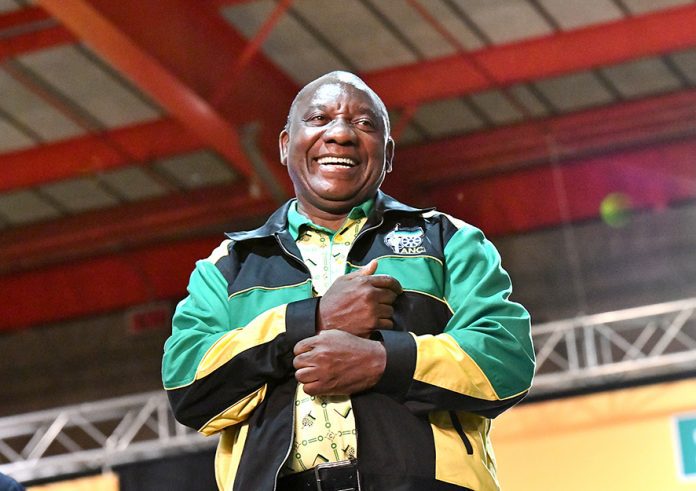The ANC faces an increasingly uncertain future as the dominant political party in South Africa following the recent scandal engulfing President Cyril Ramaphosa.
The party has steadily been losing popular support over the past two decades. It went into the last general elections in 2019 with only one trump card – Ramaphosa. He has been the party’s main vote winner following his predecessor Jacob Zuma’s corrupt rule, which ended in February 2018.
The ANC built its 2019 election campaign around Ramaphosa after polls showed that he was its only leader who continued to enjoy substantial credibility among voters. Even then, the ANC won only 57.5% of the national vote – the lowest since 1994.
But Ramaphosa’s image as an anti-corruption torch bearer – and vote winner – is in jeopardy after controversial former spy boss Arthur Fraser made a criminal complaint against him. It related to the theft of a large amount of cash in US dollars from his farm in 2020.
Ramaphosa has confirmed that money – proceeds from the sale of game – was stolen and promised to cooperate with investigators. Nevertheless, a number of questions remain unanswered. These include whether the president concealed a crime by not opening a case after the theft – and why. The matter is the subject of a police investigation.
Added to the seriousness of the allegations is that the ANC and Ramaphosa have refused to openly address the issue and sheltered behind platitudes such as “the law must be allowed to take its course”.
Based on decades of analysing the ANC and South African party politics, and taking account of unfolding indicators, my view is that the Phala Phala incident has wrecked the ANC’s chances of emerging from future elections with an outright – albeit slim –
majority. The scandal is changing the course of South African politics.
The ANC’s electoral eggs are all in the Ramaphosa basket. Because of his electoral pull, he has become the pivot on which the ANC has revolved since his election as party president in 2017. He has also managed to prevail over the faction allied to Zuma in the ANC’s national executive committee – the highest decision-making body in between its five-yearly national conferences.
His star has also been rising in the party’s provincial structures. His campaign for a second term as ANC president by mid-June had been endorsed by four out of nine provinces. Among these four, Limpopo, Eastern Cape and Mpumalanga will take significant numbers of voting delegates into the elective conference.
The US dollars scandal came as ANC members in KwaZulu-Natal and Gauteng were preparing to hold their provincial leadership elections and indicate preferences for future national leadership. Both provinces are key to ANC dynamics.
KwaZulu-Natal is a stronghold of the Zuma faction even though he is facing corruption charges and his ruinous reign is associated with state capture. His supporters have made a meal of the narrative that he is being politically persecuted by the judiciary – at Ramaphosa’s behest – for championing “radical economic transformation”.
But the faction is tainted by it being the political home of an inordinate proportion of those in the ANC who have been implicated in state capture and corruption.
The scandal has, in all likelihood, shifted the balance of power against Ramaphosa.
This will potentially have two major consequences. The first is that it could rob the ANC of its best chance of eliminating corruption in its ranks. And second, it could rob the party of any chance of regaining voter confidence.
The latest scandal has stripped Ramaphosa of what credibility was left of his anti- corruption credentials. It also potentially puts him in a tough spot.
If he is charged with dealing in – or not declaring – large amounts of foreign currency he’ll be forced to relinquish his leadership. This would be in terms of an ANC resolution requiring that party members charged with criminal offences to vacate their posts. He will thus not be eligible for election as ANC president in December.
A likely scenario, however, is that the ANC simply stops enforcing its step-aside measure. As it is, a number of ANC candidates who command sufficient support in the party’s structures to get elected into leadership positions have been charged with corruption.
But setting aside the rule will destabilise the ANC further, given that a number of aspiring candidates have already been disqualified on these grounds.
The ANC’s shelves are bare. It has no credible alternative leaders. As such the “renew and rebuild” programme associated with Ramaphosa is discredited.
As if that was not trouble enough, the party’s policy documents in preparation for its upcoming national policy conference (mooted for next month) offer little.
The ANC was already in trouble long before the scandal broke. The euphoria that followed Ramaphosa’s promises of renewal had already faded. Phala Phala simply confirmed the new status quo.
It is a new type of ANC on the horizon – a tainted party with declining hegemony. The spectre of coalition politics, with its political brinkmanship and policy ransoms beckons.
- Booysen is visiting professor and professor emeritus, at the University of the Witwatersrand. This article first appeared on The Conversation
To read more political news and views, click here.
Follow @SundayWorldZA on Twitter and @sundayworldza on Instagram, or like our Facebook Page, Sunday World, by clicking here for the latest breaking news in South Africa. To Subscribe to Sunday World, click here.



